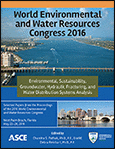The Onsite Wastewater Industry and Our Carbon Footprint
Publication: World Environmental and Water Resources Congress 2016
Abstract
Why do you do what you do? Why are you in the decentralized wastewater industry? I joined the wastewater industry to interact directly with society and protect public health.I joined the decentralized wastewater industry because it is the most environmentally-sound, passive form of wastewater treatment and recycling. But what is truly saved by using decentralized wastewater treatment? And what can we do as an industry to help negate the growing environmental and fiscal problems facing society today? The environmental and economic benefits provided through the manufacture and construction of onsite (decentralized) wastewater systems versus centralized wastewater treatment plants were quantitativelyexamined through an analysis of embodied energy, embodied carbon, and the cost of each system type. The average decentralized system versus connecting to a sewer extension were found to reduce embodied energy, embodied carbon, and cost by 75%, 73%, and 68%, respectively. With the clear environmental and economic benefits associated with decentralized wastewater treatment systems, it is imperative that local, state, and national regulators shift the focus of wastewater treatment from centralized sewer systems to the more sustainable decentralized model. Doing so will greatly aid in the efforts to reduce the carbon footprint associated with development as well as reduce the cost of development for both government entities and end users. In addition, the environmental impacts of both a precast concrete septic tank and gravel/pipe drainfield (conventional) onsite systems and systems using recycled thermoplastics were evaluated. Water consumption, electricity consumption, fuel consumption, and carbon emissions were evaluated through raw material production, product manufacturing and transportation for both systems. It was determined that when transporting a recycled thermoplastic system 1,030 miand a conventional system only 30 mi, the recycled system reduced electricity consumption by 88%, fuel consumption by 67%, water consumption by 97%, and carbon emissions by 44%. Our everyday choices as members of the decentralized wastewater industry have an impact on the environment around us. What if we, as an industry, stood up through our local representatives and legislators to push for more funding of decentralized systems? What if we made daily choices that express our concern of the environment and chose to operate sustainably? We, as an industry, have the opportunity to lead–to build a sustainable and inspiring industry that gathers young, eager minds, ready to change the world. Let’s grasp the opportunity. Let’s start with why.
Get full access to this chapter
View all available purchase options and get full access to this chapter.
Information & Authors
Information
Published In
Copyright
© 2016 American Society of Civil Engineers.
History
Published online: May 18, 2016
Authors
Metrics & Citations
Metrics
Citations
Download citation
If you have the appropriate software installed, you can download article citation data to the citation manager of your choice. Simply select your manager software from the list below and click Download.
